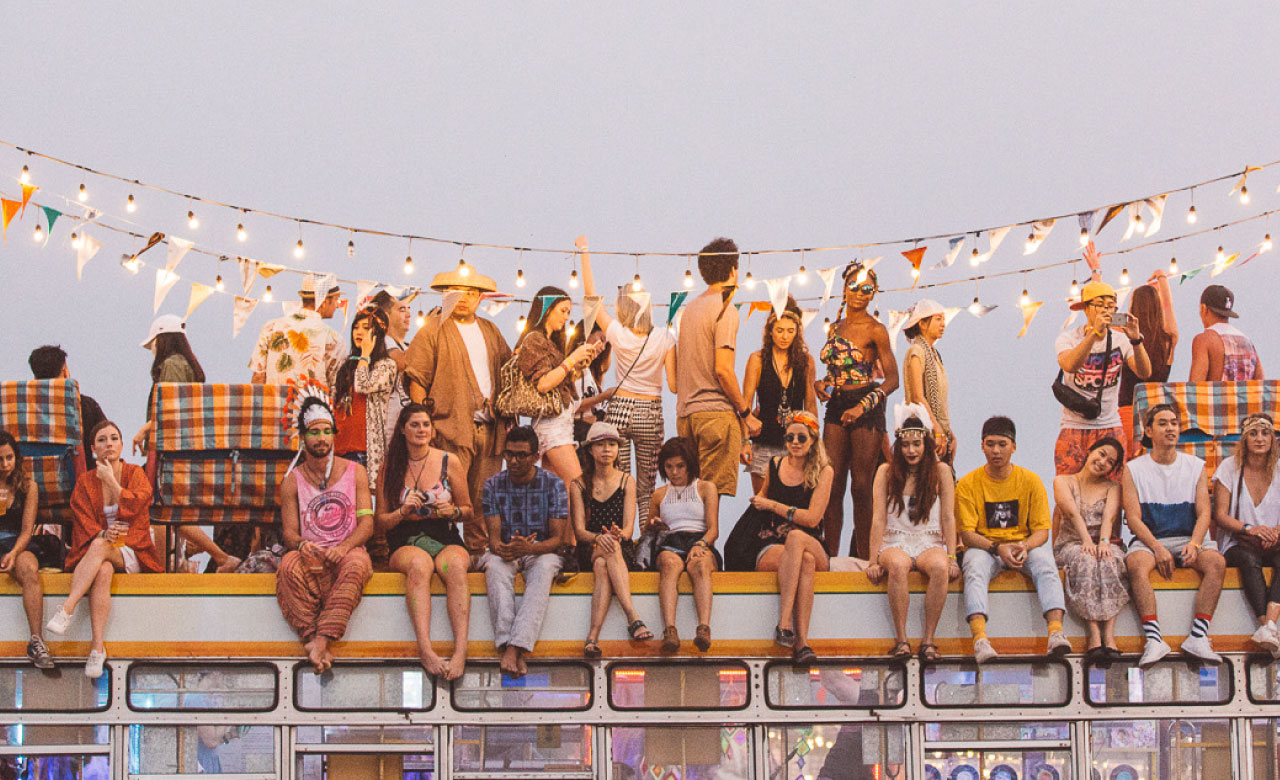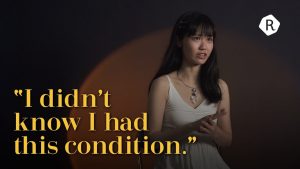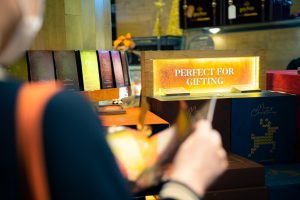I am heading to Wonderfruit, I have been telling my friends, left and right.
Oh, I see. I have never been to a music festival before, said one.
Is that like Burning Man? ElectricDaisyCarnival? TomorrowLand? chipped in another, a hardcore festival-goer.
No, not quite. I said, left and right. It is not just a music festival. It is not an art festival either … It’s like a cultural, music, and lifestyle festival.
What kind of lifestyle? They asked.
A sustainable one. An environmentally and socially conscious and responsible one, I said.
They nodded. Ahh—so like … a hippie rave, a hippie gathering. Yoga chicks and neo-shaman types.
Yes.
With sex-drugs-and-rock&roll?
Yes.
How is that in any way conscious and responsible?
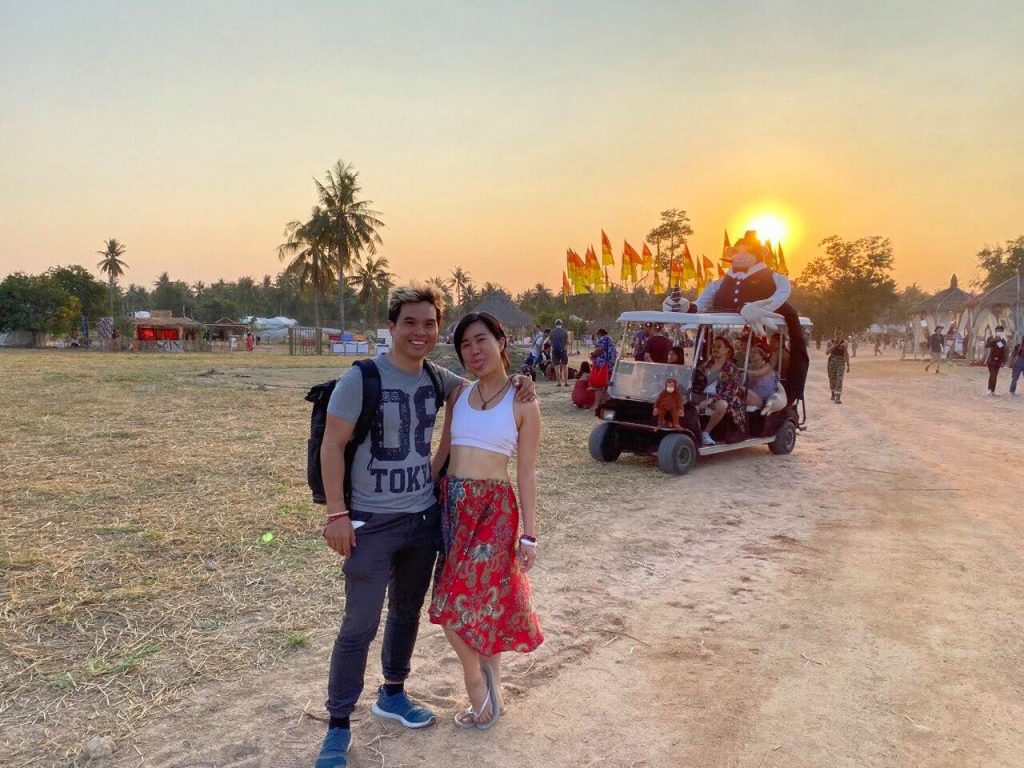
After sunset, Wonderfruit transforms into a raving love affair on multiple party stages. Everything is a repeat installation from previous years, yet no less extraordinary: a twinkling molam bus buzzing with electronic-techno music and technicolour neon glows; Polygon, an intricate bamboo construction outfitted in glamorous LED lights. Theatre stage had a charming overarching thatched roofs, floating on dark waters. World-class DJs spun their jams all night long, into the chiming bells of the dawn at Solar Stage. A regular creation by Burning Man artist, Gregg Fleishman, is a climbable adult playground structure made of slotted wood panels, perfect for sunrise catching.
Wanderers are dancing and rolling and tripping in droves, in a collective mass euphoria that rivals the transcendental experiences in mega churches and Tony Robbins conferences. I let myself flow with the mainstream current, and shove my adulting problems into the recesses of my mind. It becomes easy to forget, to escape into these psychedelic dreamscapes. Yet, the deadline, the deadline ticktocked at the back of my mind. I had to write something—what else, what else, is so special about Wonderfruit?
Let’s see, how about sex?
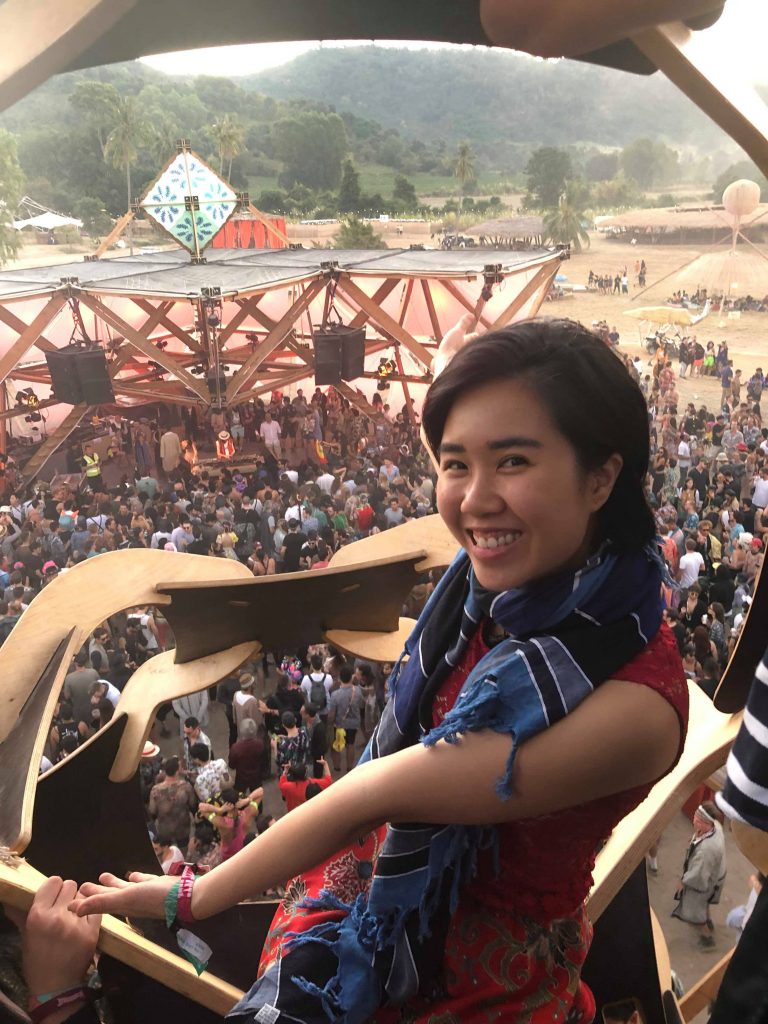
I attended a panel on the second day titled “Better Sex”, a talk on communicating desire and consent. The speakers were Sara Tang, a Hong Kong-based sexologist; Mistress Eva, a professional Singaporean dominatrix, and PG, an improvisational comedian.
“For women in traditional societies, due to cultural conditioning, it is very difficult for us to say NO,” said Sara Tang.
“We feel obligated. In sexual context, if we flirt with someone, then we have to follow through to the end, in service to male pleasure. This is the main problem driving consent discussions these days.”
“And not just consent in the bedroom,” added PG, “In any type of communication in a relationship, we need to enter an agreed-upon consent for both parties. Even if you are married, consent needs to be communicated properly at each point.”
“But, consent is sooo boring! What is sexy about consent?” asked one participant, a bombshell brunette in a two-piece leather suit.
Mistress Eva, with her luscious red lips, pearly white skin and deep, earthy voice shifted her gaze at her.
“Oh … I’ll show you how …”
She came face to face with the beautiful doe-eyed Sara, who had the sweetest, dreamiest smile. “Sara, would you like me to lick your toes?”
“Yes Mistress.”
“How would you like me to lick them? Do you want me to suck your toe, one.. by… one..?”
“No Mistress,” rejected Sara firmly—at this point PG cued the participants to celebrate Sara’s assertion of “no”.
“However …” Sara batted her eyelashes playfully. “I would like you to swirl your tongue around each toe, one … by one … How about that?”
“I would love to,” cooed Mistress Eva.
And so on and so forth with the role-play.
PG talked about coming up with an interesting scale metric to communicate consent with his wife, in all aspects of their lives.
“The scale goes from negative ten to positive ten,” he said. “For example, if I want to go see a Star Wars movie, I’d ask her and she might say ‘I am a negative three to see Star Wars, how are you on the scale?’, and I might be an eight. This will help her make a decision—whether making me feel an eight happy can offset her negative three on the scale. So everything is more clear-cut and negotiated fairly.”
Done consciously, sex and relationships are a long game of seduction—of asking, offering, negotiating, accepting, and rejecting. This is a higher level game that I had never played properly before, in and out of the bedroom: to look into someone else’s eyes deeply and negotiate these extremely charged requests.
The key things to note here? Honesty and respect. Respectful, radical honesty and the celebration of honesty, even if that means rejecting and hurting others’ feelings.
“You can’t take care of your own needs if you are constantly taking care of others’ needs,” Sara concluded.
I then wandered off to the eco pavilion, where a circle of cannabis enthusiasts discussed the potential of Thailand becoming the next Holland in South East Asia.
The panel was given by a colorful cast of personalities. Cannabis production expert Don Land looked like a colonial land-owner: curly moustache, pot-belly, khaki uniform and all. Arun Avery, the co-founder of Highland—a Thai nonprofit dedicated to discussing marijuana—sported the nerdy good looks of a scientist-entrepreneur. The former President of the International Narcotics Control Board Viroj Sumyai looked appropriately grave and dignified. And finally, the electric Singapore-born Michelle Lhooq, a music journalist, writer, and weed rave host based in Los Angeles and New York City. They talked extensively about mind-altering substances, how countries came to legalise certain substances such as alcohol and tobacco while criminalising others, such as cannabis and psychedelic substances.
Cannabis, or ganja, was introduced to Thailand from India. It has historically been used in the region as an ingredient, a kitchen condiment, a medicine, and a source of fiber. In Thailand, cannabis was criminalised by the Cannabis Act in 1935, following its prohibition in the United States. Cannabis activists have long been convinced that US prohibition had more to do with the politics over sales of hemp and paper, as well as the racial politics against native Americans, rather than the scientific-proven danger of cannabis itself. Now that North America is starting to relax their regulations, activists are hopeful that the rest of the world will follow as well.
“Education, research, and transparency are key to legalisation,” said Arun Avery.
“We have all these natural healing substances abound in South East Asia. If they are used properly, they can be very powerful in curing physical and mental ailments, including for psychotherapeutic use.”
He explained that when things are made illegal, impure substances circulate in the black market, abused by those who are not supposed to take them—such as those with a genetic predisposition to psychosis—and therefore exacerbating the bad reputation surrounding them.
“A lot of substances that we know today as illegal are actually far less harmful physically and far less addictive than alcohol and tobacco,” chipped in Don Land, twirling his moustache.
Michelle Lhooq wished to create safe havens: parties inspired and fueled by ‘kinder’ plants like cannabis. Her underground weed raves in New York City and Los Angeles have brought people and brands together in ways that the Internet can’t.
“I think it does create a huge difference,” said Michelle. “When a party supports cannabis rather than any other forms of substances, like alcohol, it becomes less violent, less disruptive. I think that while alcohol lowers inhibition, cannabis actually heightens sensitivity, so the irony here is people actually might become too self-conscious.There is less risk of overstepping others’ boundaries when being high on weed.”
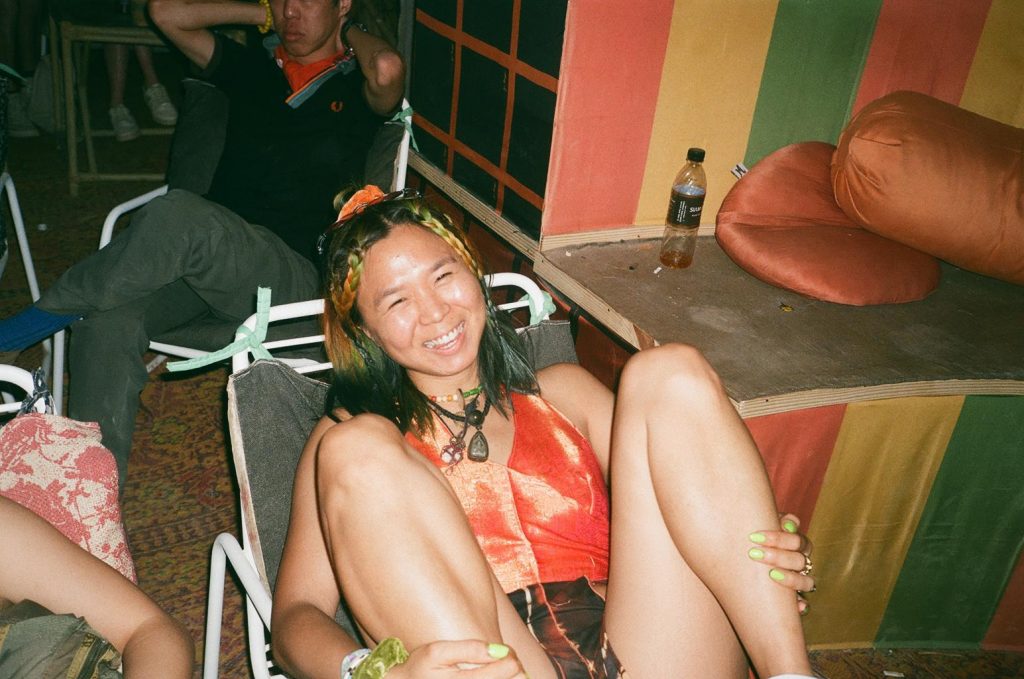
My last night at Wonderfruit, I was determined to link up with my photographer to take some professional pictures for this article. It wasn’t easy; we had been partying too hard.
What picture do you want? asked Marisse, my photographer.
Let’s find Michelle Lhooq and take a nice picture of her, I decided.
We texted Michelle about her whereabouts. No reply. We strolled lazily under the yellow moon, the silhouette of a mountain range stretching into the distant horizon. Marisse told me her sources said that Michelle would be at Neramit tent around midnight, to support a common DJ friend. Midnight is still a while away, Marisse said.
I spotted a stall selling “happy brownies” and got a piece for myself. It tasted like a normal brownie, albeit with a slightly pungent smell. Another pop-up truck was selling “magic mushroom tea”. I ordered a cup and started sipping on it—it tasted like any other herbal concoction. It was my last night after all. We’ll see what happens.
Within thirty minutes, places and people started to swirl around me, merging and dissipating like watercolour. I had tried psychedelics before, back when I was living in California, so I was expecting nausea and anxiety to hit before the happy feels surfaced. This did not happen, but I was not taken by euphoria either. Everything was just wobbly, my brain slowed to a fraction of its normal speed.
I lay on the grass at the side of the Solar Stage and decided to take a nap.
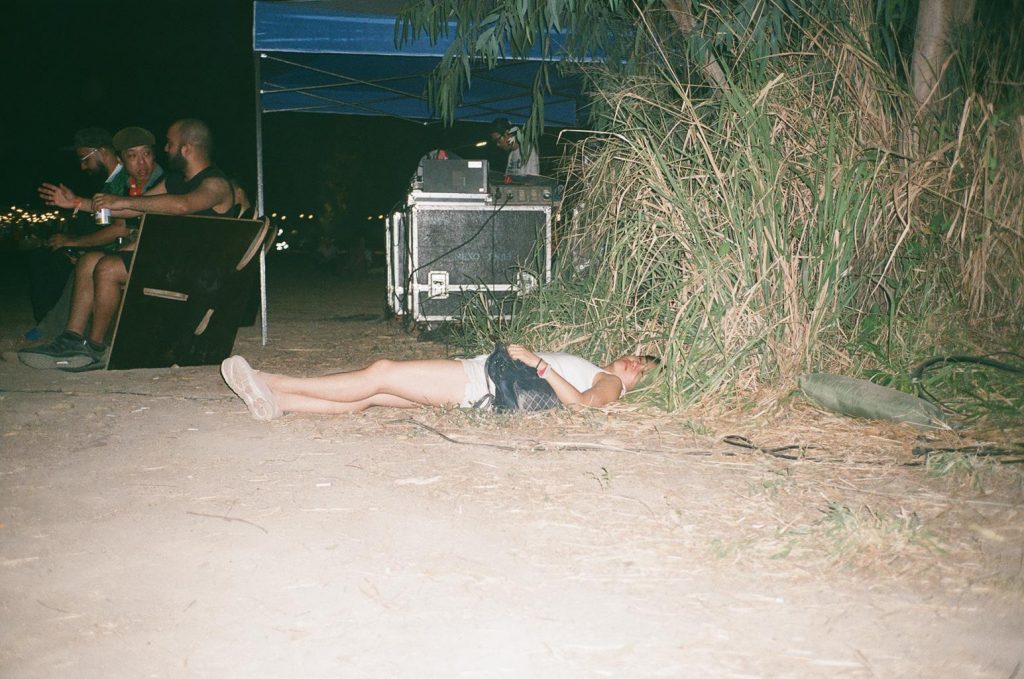
When I woke up, everybody was gone. The writhing body of the faceless crowd jumped maniacally to the deafening techno beats. I climbed onto a bench, next to a bearded man, contemplating my life.
Feeling good, eh? The man grinned at me. He was wearing a baseball cap and a bling bling necklace.
I don’t know, I said. I watched the dancing bodies.
How do you know … I started … How do you know if you like a girl, I pointed at a handsome muscular lady sipping on a can of beer, or a boy, I pointed at a feminine looking boy wearing peacock feathers.
The bearded man was taken aback. Good question, he laughed. I don’t know the answer to this one. How do you know?
I don’t know.
The man yawned and left, leaving me alone on the bench. Shortly after, someone else came and sat next to me. He said his name was Sebastian, based in the US, originally from South Korea.
I just took mushroom tea, I told Sebastian. I am on a journey now.
You did? Sebastian exclaimed. Me too. I am so happy we are on this journey together.
I told Sebastian some of my problems. I had just quit my job and broke up with yet another boyfriend. I was supposed to find Michelle Lhooq at Neramit at midnight. I had no idea how to get there.
You just quit your job? What are you going to do next? Who is Michelle?
I looked at him, bewildered. I was about to answer, but all I could muster was, I don’t know.
Sebastian said he knew where Neramit was. He walked with me across the festival grounds, commenting on the magnificence of colours and lights and sounds all around us. I could not process everything he was saying. I knew he was so close to me. We found Neramit tent and sat side by side next to a table. Sebastian kept yapping away, and then he put his arm around me. I shifted uncomfortably.
Thanks for taking me to Neramit, I told him.
No worries Alice, he said. I want to be your friend, would you let me be your friend?
Suddenly, I spotted Marisse at a corner of the tent. There is my photographer! I got up to approach her, and Sebastian followed closely at my heels. Alice, Alice, would you like me to help you find Michelle?
I turned to face him squarely and said: No Sebastian, I don’t want your help anymore. It was clear and firm—my rejection—it surprised me thoroughly. The poor guy was equally taken aback.
You don’t …?
Yes, thank you for taking me here. I am good now. I found my friends. I don’t need your help anymore.
Don’t you want to be my friend?
No.
No is good, no should be celebrated, stand firm in your no, I heard PG’s lecture in my mind.
Sebastian walked away, defeated. I then linked up with Michelle and Marisse took a snap of her. Mission accomplished. I exhaled with relief.
And that was it, the pinnacle of my Wonderfruit experience, the precious message received from the spirit world: comfort in the unknown, trust in the process, faith in the universe, and everything else will fall into its place.
